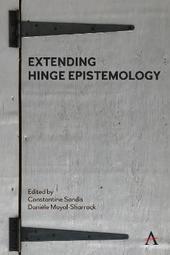
|
Extending Hinge Epistemology
Hardback
Main Details
Description
Hinge Epistemology is rapidly becoming one of the most exciting areas of epistemology and Wittgenstein studies. In connecting these two fields it brings a revived energy to both, opening them up to fresh developments. The essays in this volume extend the subject in terms of both depth and breadth. They present new voices and challenges within hinge epistemology. They explore new applications and directions of hinge epistemology, particularly as it relates to the philosophy of mind, society, ethics, and the history of ideas.
Author Biography
Constantine Sandis is professor of philosophy at the University of Hertfordshire, a founding director of Lex Academic, and a fellow of the Royal Society of Arts. Daniele Moyal-Sharrock is professor of philosophy at the University of Hertfordshire and president of the British Wittgenstein Society.
Reviews'Edited by two leading authorities on Wittgenstein's philosophy, this volume further extends and consolidates the burgeoning research programme on 'hinge epistemology'. The epistemic lessons to be derived from reflection on the epistemology of certainty are opened out to domains beyond the purely epistemic such as, politics, ideology, the extended individual, etc.' - Dr. Nigel Pleasants, Senior Lecturer in Philosophy and Sociology, University of Exeter, UK. 'Never before have epistemologists been so genuinely interested in Wittgenstein's later work as in recent years. Extending Hinge Epistemology brings together insightful essays by some of the leading scholars in the field and will be essential reading for anyone seeking to go beyond the mere exegesis of On Certainty.' - Nuno Venturinha, NOVA University of Lisbon, Portugal. 'Hinge Epistemology: Fastening the Hinges, Opening the Door provides a further demonstration of the wide-ranging significance of Wittgenstein's thoughts on knowledge, doubt and certainty for philosophical epistemology and for our thinking about human life more generally. The authors, comprising both established experts in the field and more up-and- coming scholars, develop the approach of hinge epistemology in fruitful ways, bringing out its relevance to multiple areas of human thought and activity, including religion, politics, scepticism and enactivism, as well as considering the extent to which the approach was prefigured in the work of earlier philosophers such as David Hume and Thomas Reid. The volume constitutes a valuable contribution to contemporary epistemology and Wittgenstein studies.' - Dr Mikel Burley, Associate Professor of Religion and Philosophy, University of Leeds, UK.
|